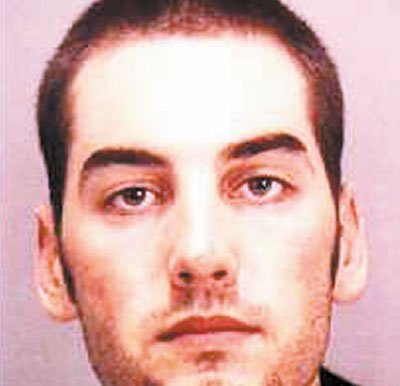The driver whose carelessness cost a Gilroy teen her life
shunned a second chance to complete his probation, opting instead
to spend a full year behind bars.
Gilroy – The driver whose carelessness cost a Gilroy teen her life shunned a second chance to complete his probation, opting instead to spend a full year behind bars.
Nearly three years ago Erin Kinkel died when she was flung from the bed of Anthony McDowell’s pickup as the Morgan Hill teen veered off a country road. McDowell pleaded guilty and was convicted of misdemeanor vehicular manslaughter in 2005 – a charge that packs a maximum sentence of a year in jail.
Superior Court Judge Susan Bernardini opted for a lighter punishment: 300 hours of community service and more than $16,000 in fees and restitution, including $14,425 to cover the Kinkels’ counseling and funeral fees. She asked that he speak to teens about the crash, the same way Erin’s father Scott Kinkel has done, spreading his drive-safe gospel to thousands of local teens.
Thursday, McDowell admitted he’d failed to complete his community service, failed to pay his court-ordered fines – had paid less than 1 percent the sum, in fact – and Superior Court Judge Hugh Mullin called his probation “completely unsuccessful.”
Prosecutor Amir Alem wanted the judge to jail McDowell. He didn’t expect McDowell to choose jail.
Judge Mullin offered McDowell a six-month jail sentence and an extension of his probation, which would require him to complete his community service and pay his fine. McDowell refused probation, and was sentenced to one year in county jail and more than $3,000 in fines. His driver’s license was revoked.
“You almost pulled one over on the court, you know?” Mullin said angrily. “You really got away with it.”
Because McDowell refused probation, he is no longer required to perform community service, or to pay the Kinkels’ restitution, Alem explained. The Kinkels were deflated after the hearing, one of the last on the judge’s 9am calendar.
“It’s a wasted year,” said Erin’s father Scott Kinkel. “He chose the easy way out.”
“If he had talked to teens,” her mother Miki Kinkel said, “he might have saved lives.”
Cheryl McDowell, Anthony’s mother, didn’t attend the hearing. When contacted by the Dispatch, she defended her son’s choice, saying he’d done hours of community service that had gone uncounted by probation – why, she wasn’t sure. The man Cheryl McDowell was dating when Kinkel died, John Freeze, said he was surprised by the young man’s decision – but knew he’d suffered deeply.
“He’s living a hell in his mind, and nothing that’s imposed is going to change anything,” said Freeze. “It was just a tragedy and an accident. But Anthony still had an obligation to fulfill, and he didn’t do that. So the courts took the next step.”
At Thursday’s hearing, McDowell didn’t explain why he refused probation, effectively choosing six more months in jail. The trauma has literally marked him: When Sheriff’s deputy George Hessling arrested him at a friend’s Morgan Hill home, his right arm bore a new tattoo. A skull, a rose, and the words ‘A Friend Never Forgets.’ A message not so different from the blue silicon bracelets Scott and Miki Kinkel wore Thursday in court: ‘Forever In My Heart.’
News that McDowell had skirted his sentence angered the Kinkels and family friends, some of whom thought the sentence light to begin with. Bernardini’s mercy extended well beyond sentencing: When probation officer Phillip Williams notified her that McDowell had violated his probation, Bernardini asked the officer to try to reach him “one last time” before declaring him in violation.
Alem, the prosecutor, found McDowell’s choice troubling.
“What he basically showed today was that he lied” during his initial sentencing hearing, Alem said.
McDowell spoke movingly during his wrenching two-day sentencing hearing in 2005. He described his nightmares, broke down in tears and pleaded, “My punishment does not start when you give it to me. My punishment started that night when I knelt next to Erin. My punishment started that instant and my punishment will never end.”
Recalling those words, Alem was aghast. “He’d rather do a year in county jail,” he said, “than six months and 300 hours of community service.”
The Kinkels could seek the unpaid restitution through civil court, said Alem, but as they left Superior Court Thursday, the couple said they aren’t champing at the litigation bit.
“I don’t think I ever want to step foot in a courtroom for the rest of my life,” said Scott Kinkel.














